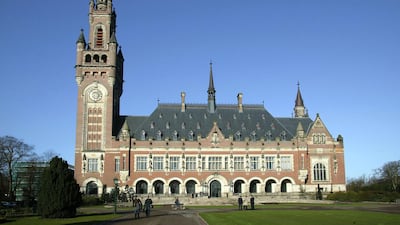The UN’s highest court ruled on Wednesday that it will proceed with Iran’s legal bid to overturn US nuclear sanctions that were reimposed by former US president Donald Trump’s administration.
International Court of Justice (ICJ) President Abdulqawi Ahmed Yusuf said the 16-justice panel rejected Washington’s procedural objections and that the court would hear a case brought by Iran in 2018.
In an hour-long ruling at the court's Great Hall of Justice at The Hague in the Netherlands, Mr Yusuf said the tribunal "finds consequently that it has jurisdiction.... to entertain the application filed by the Islamic Republic of Iran".
Iran brought the case against the US to the court in July 2018, two months after Mr Trump pulled the US out of the 2015 international nuclear deal with the Islamic republic.
Iran said the sanctions breached a friendship treaty between the two nations that was signed in 1955, when Iran was ruled by the pro-western Shah Mohammad Reza Pahlavi.
According to Tehran, sanctions reintroduced by the Trump administration caused “hardship and suffering” and were “ruining millions of lives”.
A final judgment in the case could be months or even years away.
The US responded by formally ending the 1955 treaty. It argued that the court did not have jurisdiction and should throw out the case and that sanctions were necessary because Iran posed a “grave threat” to world security.
Mr Trump unilaterally exited the 2015 nuclear deal with Iran and major world powers in May 2018, over objections from America’s European allies and other signatories to the deal.
He reimposed sanctions on Iran and companies with ties to it, notably hitting Iran’s oil sector and central bank, while major global firms halted their activities in Iran.
The deal, involving the five permanent members of the UN Security Council — Britain, China, France, Russia and the US, plus Germany — curbed Iran’s nuclear programme to stop it from producing a weapon.
The ICJ was set up after the Second World War to deal with disputes between UN member states.
The ruling comes weeks after the inauguration of President Joe Biden, who has voiced support for returning to the accord but has insisted that Tehran must stop enriching uranium and return to compliance with the deal before he lifts US sanctions.
Iranian President Hassan Rouhani on Wednesday ruled out changes to Iran’s nuclear accord with world powers and dismissed calls to broaden the terms of the deal and include regional countries, such as Saudi Arabia, which seeks a seat at the negotiating table.
Iran's Foreign Minister Mohammad Javad Zarif on Monday asked the European Union to coordinate a return to compliance with the 2015 deal by both Washington and Tehran.
The US State Department did not embrace the Iranian proposal.
Farshad Kashani, an expert in international law, said on Twitter on Wednesday that the “first ICJ ruling to apply to the USA” under the Biden administration may “have a significant effect on the implementation of secondary sanctions” against Iran.
Key facilities
- Olympic-size swimming pool with a split bulkhead for multi-use configurations, including water polo and 50m/25m training lanes
- Premier League-standard football pitch
- 400m Olympic running track
- NBA-spec basketball court with auditorium
- 600-seat auditorium
- Spaces for historical and cultural exploration
- An elevated football field that doubles as a helipad
- Specialist robotics and science laboratories
- AR and VR-enabled learning centres
- Disruption Lab and Research Centre for developing entrepreneurial skills
Checks continue
A High Court judge issued an interim order on Friday suspending a decision by Agriculture Minister Edwin Poots to direct a stop to Brexit agri-food checks at Northern Ireland ports.
Mr Justice Colton said he was making the temporary direction until a judicial review of the minister's unilateral action this week to order a halt to port checks that are required under the Northern Ireland Protocol.
Civil servants have yet to implement the instruction, pending legal clarity on their obligations, and checks are continuing.
One in nine do not have enough to eat
Created in 1961, the World Food Programme is pledged to fight hunger worldwide as well as providing emergency food assistance in a crisis.
One of the organisation’s goals is the Zero Hunger Pledge, adopted by the international community in 2015 as one of the 17 Sustainable Goals for Sustainable Development, to end world hunger by 2030.
The WFP, a branch of the United Nations, is funded by voluntary donations from governments, businesses and private donations.
Almost two thirds of its operations currently take place in conflict zones, where it is calculated that people are more than three times likely to suffer from malnutrition than in peaceful countries.
It is currently estimated that one in nine people globally do not have enough to eat.
On any one day, the WFP estimates that it has 5,000 lorries, 20 ships and 70 aircraft on the move.
Outside emergencies, the WFP provides school meals to up to 25 million children in 63 countries, while working with communities to improve nutrition. Where possible, it buys supplies from developing countries to cut down transport cost and boost local economies.
The specs
Engine: 2.0-litre 4cyl turbo
Power: 261hp at 5,500rpm
Torque: 405Nm at 1,750-3,500rpm
Transmission: 9-speed auto
Fuel consumption: 6.9L/100km
On sale: Now
Price: From Dh117,059
BMW M5 specs
Engine: 4.4-litre twin-turbo V-8 petrol enging with additional electric motor
Power: 727hp
Torque: 1,000Nm
Transmission: 8-speed auto
Fuel consumption: 10.6L/100km
On sale: Now
Price: From Dh650,000
Red flags
- Promises of high, fixed or 'guaranteed' returns.
- Unregulated structured products or complex investments often used to bypass traditional safeguards.
- Lack of clear information, vague language, no access to audited financials.
- Overseas companies targeting investors in other jurisdictions - this can make legal recovery difficult.
- Hard-selling tactics - creating urgency, offering 'exclusive' deals.
Courtesy: Carol Glynn, founder of Conscious Finance Coaching
Jetour T1 specs
Engine: 2-litre turbocharged
Power: 254hp
Torque: 390Nm
Price: From Dh126,000
Available: Now
WHAT%20ARE%20THE%20PRODUCTS%20WITHIN%20THE%20THREE%20MAJOR%20CATEGORIES%3F
%3Cp%3E%3Cstrong%3EAdvanced%20materials%3A%3C%2Fstrong%3E%20specifically%20engineered%20to%20exhibit%20novel%20or%20enhanced%20properties%2C%20that%20confer%20superior%20performance%20relative%20to%20conventional%20materials%3C%2Fp%3E%0A%3Cp%3E%3Cstrong%3EAdvanced%20components%3A%3C%2Fstrong%3E%20includes%20semiconductor%20components%2C%20such%20as%20microprocessors%20and%20other%20computer%20chips%2C%20and%20computer%20vision%20components%20such%20as%20lenses%20and%20image%20sensors%3C%2Fp%3E%0A%3Cp%3E%3Cstrong%3EAdvanced%20products%3A%3C%2Fstrong%3E%20includes%20personal%20electronics%2C%20smart%20home%20devices%20and%20space%20technologies%2C%20along%20with%20industry-enabling%20products%20such%20as%20robots%2C%203D%20printing%20equipment%20and%20exoskeletons%3C%2Fp%3E%0A%3Cp%3E%3Cem%3ESource%3A%20Strategy%26amp%3B%3C%2Fem%3E%3C%2Fp%3E%0A
Zodi%20%26%20Tehu%3A%20Princes%20Of%20The%20Desert
%3Cp%3E%3Cstrong%3EDirector%3A%20%3C%2Fstrong%3EEric%20Barbier%26nbsp%3B%3C%2Fp%3E%0A%3Cp%3E%3Cstrong%3EStarring%3A%20%3C%2Fstrong%3EYoussef%20Hajdi%2C%20Nadia%20Benzakour%2C%20Yasser%20Drief%3C%2Fp%3E%0A%3Cp%3E%3Cstrong%3ERating%3A%3C%2Fstrong%3E%204%2F5%3C%2Fp%3E%0A


